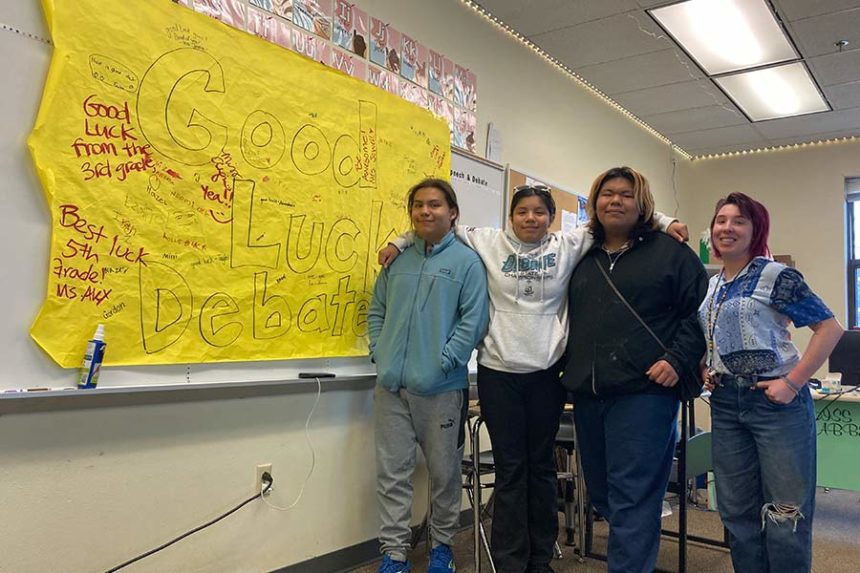Making History for Debate in Idaho
April 25, 2024

In a groundbreaking stride for Indigenous representation, three students from Shoshone-Bannock Jr. and Sr. High School are poised to make history at the National Speech and Debate Tournament in Des Moines, Iowa. Started by two ISU alumni, this is the first all-Indigenous speech and debate team in Idaho.
Making history for Indigenous People
For Luzahan Matsaw, Aiyana Eschief, and Seth Stacey, this journey represents more than just a competition—it's a testament to their individual resilience and that of their heritage. As they prepare to step onto the national stage, they carry with them the weight of history and the hopes of their people.
“This is a big thing for us because we’re making history for our people, and they’re proud of us,” Stacey says. “So I’m proud that I helped with the history.”
Their participation not only elevates the profile of their school but also amplifies Indigenous narratives on a platform where they've historically been marginalized.
Two ISU alumni made it happen
Jett Smith, an ISU alumni and current student who graduates in May with a master's degree in communications, has been coaching speech and debate for six years, starting at Rigby High School as an assistant coach, and spending the last four years at Highland High School. Abbey Vaughn earned her bachelor’s in K-12 special education with a specialty in gifted learners. She teaches sixth, eighth, tenth, and twelfth grade English at Shoshone-Bannock Jr. Sr. High School. Both Jett and Abbey were on the ISU debate team during their undergraduate studies at ISU. Abbey served as president of the ISU debate team during her senior year.
Jett says that local individuals involved in debate had been having conversations about how they wished more Indigenous kids participated in debate. Abbey dreamed of having an all-Indigenous debate team. Together they realized there was a way to start a new team at Shoshone-Bannock Jr. Sr. High School.
With the support of the Tribe and Matt Wilson and other administrators and teachers at Shoshone-Bannock Jr. Sr. High School, Jett and Abbey proposed starting a cooperative team by partnering with Highland High School’s debate team. The teams share resources and is cooperative, until they compete separately in state and nationals. Jett says that the debate team would not have formed without Abbey.
A safe space for historically silenced people
Abbey says that participating in debate changed her life. It helped her graduate. It opened her eyes to a whole new world and helped her develop resilience.
“I’m a first generation college student and I grew up in a very low income family,” Abbey says. “I had an idea that debate was only for the upper class.”
Abbey says that she had some negative experiences before joining ISU’s debate team. In the circuit she was met with sexism, classism and homophobia on occasion. But when she joined ISU's team, Abbey saw how debate could be a safe space for historically silenced people.
“When my perspective in debate changed, I realized that I wanted to do that for others,” Abbey says, “especially kids that were at risk and grew up like I did. I wanted them to realize they had a voice and that they could make change.”
Abbey looked up to ISU debate coach, Sarah Partlow-Lefevre, who served as a role model illustrating how women could be successful in debate and have a voice. Abbey says that she tries to exemplify the example of Sarah in her own coaching. Abbey also wanted to give the gift of the debate community to others.
“I have met some of the best people in my life through debate,” she says, “and I knew others could find a home in the community also.”
Debate is a great way to give them a voice
Abbey’s vision and dreams have started to come true through the hard work of many people. Not only do the students on the team make up the first all-Indigenous speech and debate team in Idaho, they are also the first students to qualify for state from an all-Indigenous school. Aiyana Eschief and Luzahan Matsaw qualified in Policy Debate for state. Seth Stacy, Luzahan Matsaw, and Aiyana Eschief will be competing in the national tournament in June.
“I always dreamed of creating new debate teams, but I never realized the impact it would have on me and the students I teach,” Abbey says. “My students have opened my eyes to a culture I have never had the chance to learn about and they have been honest with me about their struggles living in Idaho and being people of color.”
Abbey’s philosophy is that being a coach means she doesn’t speak for the students, but rather, gives them the tools they need to speak up for themselves. Students have shared that they feel more confident in how they talk and what they talk about. They have also told Abbey that they feel like they can create change and be able to speak out for themselves and others.
And when they feel like they have a voice, what are these students sharing? Stacey’s address at the competition focuses on the urgent matter of missing and murdered Indigenous individuals. Primarily impacting Indigenous women and girls, this issue places all Indigenous people at heightened vulnerability to either being reported as missing or falling victim to homicide.
“It’s important to let people know that we’re still here,” Stacey says.” We are proud to be Indigenous and we’re trying to live our lives happily.”
“It has been my privilege to grow with them throughout the year,” says Abbey, “and I can’t wait to see what the future holds for this team and my students.”
Categories:
